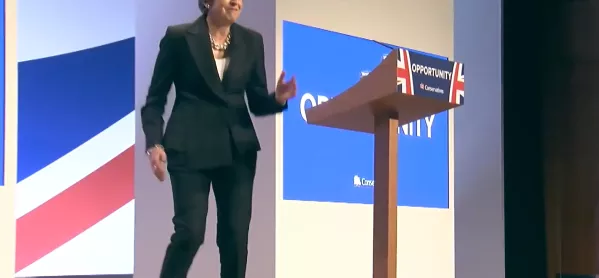Theresa May showed some good self-deprecating humour at the start of her annual address to the Conservative Party conference.
She arrived on stage to the sound of Abba’s Dancing Queen, revisiting some of her much-maligned (slightly unfairly in my view) dance moves showcased on her recent trip to Africa.
Once the speech got underway, one of her key messages was that austerity is over - 10 years after the financial crash, she said, our hard work had paid off and next year’s spending review will reduce borrowing and increase investment in public services.
The collective wince from the corridors of the Treasury was probably audible from the conference hall in Birmingham.
Money, Money, Money
What will this mean for learning, skills and employment? Has the prime minister moved from Dancing Queen to Money, Money, Money?
The short answer, I suspect, is no.
Public spending will definitely rise over the next few years. But the extra £20 billion for the NHS will swallow up a good chunk of that. And there’s pressure for extra money across the board - councils, schools, the armed forces and so on.
This is likely to mean some areas will see continued cuts and many areas won’t see funding rises in line with inflation - some spending rises are really spending cuts.
‘Need to build a coalition of support’
The challenge for us is to make sure learning, skills and employment are one of the winners from what will be another tough spending review next spring.
To do that we need to persuade Department of Education ministers that further education is too important not to invest in and that investment will be of political benefit.
We also need a wider groundswell of opinion backing this up. That’s why it’s good that Colleges Week is a partnership between college leaders, unions and students. It’s also why the stories of how learning transforms lives, such as those showcased in our Festival of Learning, matter.
Taken together, we need to build a coalition of support.
Growth weak since 2008
But the final piece in this jigsaw is persuading the Treasury. That requires us to make the case that investment in learning and skills can boost economic growth - which has been relatively weak since 2008 - and social justice, and do so in a more cost-effective way than other policy interventions.
In other words, why is putting more money into further education a better bet for growth and fairness than investing in regeneration, or transport, or housing?
We have a lot of the building blocks to make that argument. But I don’t think we’ve fully put them together yet.
I spoke at a New Statesman event at the Conservative Party Conference, sponsored by awarding the body NOCN. It was to talk about just that: the link between skills and productivity, with underpinning analysis produced by the Learning and Work Institute.
‘Productivity has effectively flatlined for a decade’
I’d encourage you to take a look, there’s a chart-tastic collection of evidence on how productivity varies by sector and region and the links across to skills.
Perhaps what struck me most was that productivity has effectively flatlined for a decade. That’s a key reason why we’re on track for the worst decade for growth in living standards since the Napoleonic Wars and why the public finances are still tight.
There’s clear evidence that improvements in skills can help to change this. But we need to help make the case that specific policy changes and investments will do that.
Austerity may be easing, but we need to shout loud for more investment. Otherwise, we might find ourselves losing out in a tough spending review where The Winner Takes It All.
Stephen Evans is chief executive of the Learning and Work Institute




